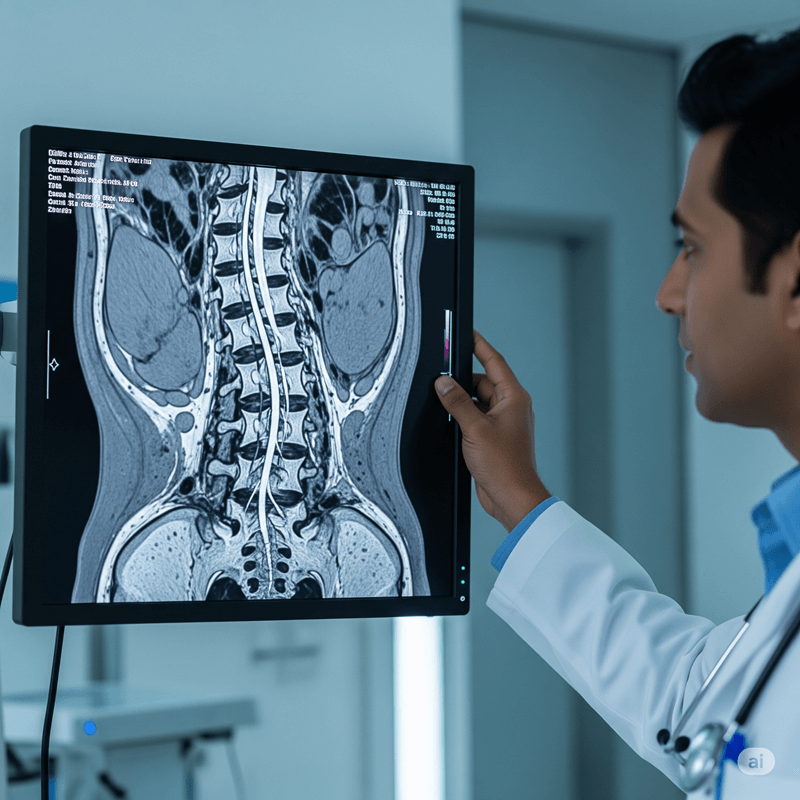In the bustling healthcare landscape of Hyderabad, MRI scans have become indispensable tools for accurate diagnosis across a wide spectrum of medical conditions. If you’ve been advised to undergo an MRI scan in Hyderabad, you might be wondering about the different types available and what each one entails. It’s more than just stepping into a large, humming machine. The world of MRI is nuanced, offering tailored techniques to visualize specific parts of the body and identify various pathologies.
This blog post serves as your comprehensive guide to the diverse types of MRI scans you might encounter in Hyderabad. Drawing on insights from local diagnostic centers and expert opinions, we’ll explore the unique capabilities of each type, moving beyond generic descriptions to provide you with a deeper understanding of how these advanced imaging techniques contribute to your healthcare journey right here in Hyderabad.

Beyond the Basics: Understanding the Spectrum of MRI Scans in Hyderabad
When we talk about an MRI scan in Hyderabad, we’re not referring to a one-size-fits-all procedure. Just like different specialists focus on different parts of the body, various types of MRI scans are designed to provide detailed images of specific organs, tissues, or even physiological processes. Understanding these distinctions can empower you to have more informed conversations with your doctor and feel more at ease about the procedure.
Let’s delve into some of the common and specialized types of MRI scans offered in Hyderabad:
Want to book MRI: Check out MRIScanHyderabad.com
1. Standard MRI: The Versatile Workhorse
The standard MRI scan forms the foundation of most MRI examinations conducted in Hyderabad. It utilizes strong magnetic fields and radio waves to create detailed cross-sectional images of the body’s internal structures. This type of MRI scan is highly versatile and can be used to visualize a wide range of organs and tissues, including the brain, spinal cord, joints, soft tissues, and internal organs.
Key Uses in Hyderabad: Diagnosing neurological conditions (stroke, multiple sclerosis), musculoskeletal injuries (ligament tears, herniated discs), abdominal and pelvic disorders, and soft tissue tumors.
2. MRI with Contrast (Contrast-Enhanced MRI): Enhancing Visibility
In some cases, a special contrast agent, typically gadolinium-based, is administered intravenously before or during an MRI scan in Hyderabad. This contrast material enhances the visibility of certain tissues, blood vessels, and abnormalities, making it easier to detect inflammation, tumors, and other pathological processes.
Unique Insight from Hyderabad: Many advanced diagnostic centers in Hyderabad utilize high-quality contrast agents and have experienced radiologists who can expertly interpret contrast-enhanced MRI scans for more accurate diagnoses.
Key Uses in Hyderabad: Detecting and characterizing tumors, identifying areas of infection or inflammation, evaluating blood vessel abnormalities (like aneurysms), and assessing the extent of certain diseases.
3. Functional MRI (fMRI): Mapping Brain Activity
Functional MRI (fMRI) is a specialized type of MRI scan that goes beyond structural imaging to measure brain activity by detecting changes in blood flow. This technique is increasingly available in advanced neuroimaging centers in Hyderabad and provides valuable insights into how different parts of the brain function.
Key Uses in Hyderabad: Mapping brain regions responsible for specific functions (language, motor skills) before neurosurgery, studying brain activity in cognitive research, and understanding neurological and psychiatric disorders.
4. Cardiac MRI: A Detailed Look at the Heart
Cardiac MRI is a non-invasive imaging technique that provides detailed images of the heart’s structure and function. While not as widely used as other types of MRI scans in routine checkups in Hyderabad, it plays a crucial role in diagnosing complex heart conditions.
Key Uses in Hyderabad: Assessing heart muscle damage after a heart attack, diagnosing congenital heart defects, evaluating heart valve function, identifying cardiac tumors, and detecting conditions like cardiomyopathy and myocarditis.
5. Magnetic Resonance Angiography (MRA): Visualizing Blood Vessels
Magnetic Resonance Angiography (MRA) is a specific type of MRI scan used to visualize blood vessels throughout the body without the need for traditional angiography involving catheters. MRA is commonly performed in Hyderabad to assess arteries and veins for blockages, narrowing, aneurysms, and other vascular abnormalities. Contrast agents are often used to enhance the images.
Key Uses in Hyderabad: Evaluating blood flow in the brain (carotid arteries), detecting renal artery stenosis, assessing peripheral vascular disease, and identifying aortic aneurysms or dissections.
6. Magnetic Resonance Venography (MRV): Imaging Veins
Similar to MRA, Magnetic Resonance Venography (MRV) focuses specifically on imaging veins. This type of MRI scan is crucial for diagnosing conditions related to blood clots or abnormalities in the venous system, particularly in the brain and lower extremities. MRV is available in many well-equipped diagnostic centers in Hyderabad.
Key Uses in Hyderabad: Detecting deep vein thrombosis (DVT), diagnosing cerebral venous sinus thrombosis, and evaluating venous malformations.
7. Diffusion-Weighted Imaging (DWI) and Diffusion Tensor Imaging (DTI): Exploring Water Molecule Movement
DWI and DTI are advanced types of MRI scans that measure the diffusion of water molecules within tissues. These techniques provide valuable information about tissue microstructure and are particularly useful in neurological imaging offered in Hyderabad.
Key Uses in Hyderabad: Detecting early signs of stroke (DWI), assessing white matter tracts in the brain (DTI) for conditions like multiple sclerosis and traumatic brain injury, and characterizing certain types of tumors.
8. Perfusion MRI: Assessing Blood Flow at the Tissue Level
Perfusion MRI is another advanced type of MRI scan that assesses blood flow and microcirculation within tissues. This technique, available in specialized centers in Hyderabad, can help in differentiating between different types of tumors and evaluating the effectiveness of cancer treatments.
Key Uses in Hyderabad: Characterizing brain tumors, assessing blood flow in ischemic conditions, and evaluating organ perfusion.
9. Spectroscopy (MRS): Chemical Fingerprinting of Tissues
Magnetic Resonance Spectroscopy (MRS) is a non-imaging type of MRI scan that provides information about the chemical composition of tissues. By measuring the levels of different metabolites, MRS can help in diagnosing and monitoring various conditions, particularly in the brain. Advanced diagnostic facilities in Hyderabad may offer this specialized technique.
Key Uses in Hyderabad: Differentiating between tumor recurrence and radiation necrosis in brain cancer patients, identifying metabolic disorders, and studying brain chemistry in neurological conditions.
10. Open MRI: Comfort for Claustrophobia
While not a specific imaging technique, Open MRI refers to the design of the MRI machine. Unlike traditional closed MRI systems, open MRI scanners have a more spacious design, which can be beneficial for patients experiencing claustrophobia. Several MRI scan centers in Hyderabad offer open MRI options.
Personal Experience from Hyderabad: I spoke with a patient in Hyderabad who had a significant fear of enclosed spaces. She shared how finding a center with an open MRI scan made all the difference in her ability to undergo the necessary diagnostic imaging.
Key Benefit in Hyderabad: Providing a more comfortable and less anxiety-inducing experience for claustrophobic patients.
11. Weight-Bearing MRI: Imaging Under Physiological Load
Weight-bearing MRI, also known as upright MRI, allows imaging of the spine and joints while the patient is in a standing or sitting position. This type of MRI scan, available in select advanced centers in Hyderabad, can reveal problems that may not be apparent in traditional supine (lying down) MRI scans, as the effects of gravity are taken into account.
Key Uses in Hyderabad: Diagnosing spinal instability, evaluating joint pain that is exacerbated by weight-bearing, and assessing biomechanical issues.
Navigating Your MRI Journey in Hyderabad: Choosing the Right Scan
The specific type of MRI scan you need will be determined by your doctor based on your medical history, symptoms, and the body part being examined. When your doctor recommends an MRI scan in Hyderabad, they will typically specify the type of scan required.
Key Takeaway: Don’t hesitate to discuss with your doctor why a particular type of MRI scan is being recommended and what information it is expected to provide. Understanding the rationale behind the choice can help alleviate any concerns you might have.
Conclusion: The Power of Diverse MRI Techniques in Hyderabad’s Healthcare
The landscape of MRI scans in Hyderabad is rich and diverse, offering a wide array of techniques to address various diagnostic needs. From standard MRI to advanced functional and molecular imaging, these technologies play a vital role in providing accurate and timely diagnoses, ultimately improving patient care in the city. By understanding the different types of MRI scans available, you can approach your upcoming procedure with greater knowledge and confidence, knowing that you are benefiting from sophisticated medical imaging right here in Hyderabad.
Have you undergone a specific type of MRI scan in Hyderabad? Share your experience in the comments below! What questions do you still have about MRI scans?

